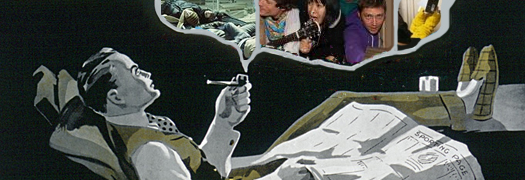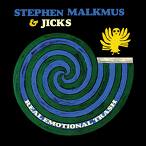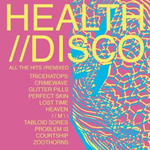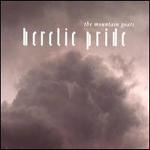
Features | Lists
By The Staff

40 :: My Morning Jacket
Evil Urges
(ATO)
Let’s get one thing out of the way: the “nuking the fridge” scene is an awesome part of an awesome movie, Indiana Jones and the Kingdom of the Crystal Skull. Further, given that it occurs exactly when it should (within the film’s first thirty minutes, so no matter how literally bombastic is it, it can’t rightly be called a climactic scene since the movie is only getting started), it must be read for what it doubtlessly is: a covenant between filmmaker and audience, a renewal of vows. “Look,” Spielberg says to us, fresh from his dozen laps in his Scrooge McDuck-like tower of money, “I know what this franchise means to you. To us. Did you think I’d forget? Did you think I’d leave you to fend for yourself in these increasingly alienating googleplexes? You’ve waited almost twenty years for completely preposterous nonsense. Did you think I would let you down?”
Likewise, on Evil Urges there’s this song called “Highly Suspicious,” and, like Indy gaping up at a mushroom cloud some sixty paces away, I’m bewildered at the critical community’s low tolerance for such obviously goofy bullshit. There has to be an element of humor in music as virtuosic (and, it needs to be said, hopelessly retro) as that made by My Morning Jacket, and for one glorious, “Funky Cold Medina”-aping moment, Jim James and co. let you see a much needed wink. Because, otherwise, come on: there’s another song on here about a sexy librarian, one that’s divided up in two parts, and something they actually called “I’m Amazed” (which, incidentally, rules). Especially on an album as sex obsessed as this one (a peanut butter pudding surprise? I have a feeling I would be), a few laughs go a long way. Besides, it’s fun to watch the looks on the faces of those who actually do take this seriously.
Christopher Alexander

39 :: Terrible Twos
Terrible Twos
(X!/Criminal IQ)
Terrible Twos is a perfect name for this band—and their debut album—which fairly shudders with hellish petulance. This is the band that would shit itself on purpose and expect you to change it. It would scream nonstop when you were trying to eat in a restaurant (“Fat Cats”). It would tell you “no” incessantly with the sole purpose of pissing you off (“Older Girls”). It gives the feeling that the listener has been caught watching porn. Like, filthy awful stuff.
There’s a scene in the awesomely morally ambivalent flick The Dirty Dozen (1967) that springs to mind implacably when I hear this record. It comes near the end of the film, after a solid hour of macho Lee-Marvin-led team building exercises. The convicts—the plot of the movie is essentially the Army’s badass plan to co-opt death row inmates for clandestine Nazi killing—are finally sent on their highly classified mission to, of course, an SS dinner party. Shit’s going off without a hitch until Archer Maggott (a ghoulish Telly Savalas)—the serial rapist and religious zealot of the group—spots a curvaceous young frau just at the moment when he’s been tasked to, you know, not fuck everything up by being a murderous sociopath. Alack, with nary a second thought, the grinning predator grabs the poor lass by the throat, stabs her in the stomach, and growls, “Scream for me, bitch.” In an instant all the ham-fisted war games and counter-culture outlaw chic are obliterated. These aren’t anti-heroes, these are awful, evil men. You feel bad for hoping these monsters could succeed at anything.
So here’s my point: if this nightmarish hit squad had listened to anything before they bunked down every night to dream of kiddy rape, it would have been Terrible Twos. It captures their inherently fucked ethos. In fact I can’t even listen to this music without Savalas’ spectral mug floating, disembodied, into my field of vision. Some things are just sleazy and malevolent no matter how much you try to intellectualize them. Or don’t. These are not value judgments, they’re just descriptors, statements of fact. The triumph of records like this is not that they lack decorum or restraint, but that they imply that those virtues are impossible in their greasy, matted down, leering context. They scorn them. They dare you to bring them up again. Go ahead, ask them to tone it down. You already know what the response will be: “Scream for me, bitch” as the cold steel mingles amongst your viscera.
Eric Sams

38 :: Ellen Allien
Sool
(Bpitch Control)
Sool is empty. Allien’s previous albums were dense with layers of microtonal beats and clipped sounds that bounce off each other like sparks off diamond cogs in a glass watch. But it’s the sonorous expanses of space that make Sool come alive, just as an acoustic guitar needs the hollow to allow the strings to ring out. Otherwise it’s just a plank of wood with dull metallic thwacks. On Sool the fractured drums and vocal skitters are sparse, given room to breathe, to seduce, to menace and to intimidate. At times, such as on “Zauber,” the bastardized clarinets and subatomic rhythms recreate the unease of over-hearing an electronic pulse in the depths of a pitch-black forest.
The darkness never fully consumes as Allien’s idiosyncratic warmth bleeds through AGF’s skeletal production. The cooing voices of “Caress” and the samples of found sounds that form the basis of opener “Einsteigen” bring humanity to the fore, saving the machine’s ghosts from completely taking over. Synthetic and organic in equal measures, Sool presents a haunting and enchanting vision of minimalism—disquieting murmurs from a robotic doll’s house.
Danny Roca

37 :: Stephen Malkmus and the Jicks
Real Emotional Trash
(Matador)
Has any one rock figure in the past ten years inspired as much frothing adulation as Stephen Malkmus? His band is half female, but the crowds at his shows sure as hell aren’t, and its an open secret that the obsessives who own copies of Pavement’s Slow Century DVD gloss over the fascinating live footage from their final shows in favor of poring over the at least 20 minutes of Malkmus in a sauna clad only in a gym towel. Clearly Matador would not release those painstakingly detailed Pavement double-disc reissues if they did not fly off the shelves, which I’m assured by my record store clerk friends that they do.
The man’s fanbase (me included) will follow him to the ends of the earth, and he’s essentially earned the right to phone it in. While latter day Pavement songs like “Type Slowly” and “The Hexx” always hinted at Malkmus’s desire to be the college DJ’s answer to Trey Anastasio, his jam-rock indebted second solo album all but affirmed it. But give him serious credit for Real Emotional Trash, ten tracks and nearly an hour’s worth of towering guitar solos and rhinoceros drumming that’re far more Pig Lib (2004) than Face the Truth (2006), and better for it. Trash stretches Pig Lib’s virtuosity to sometimes obscene new lengths, the ten-minute, multi-suite title track equally essential as “Dragonfly Pie”’s Dead Meadow descent into blooze-metal hell or the electric piano solemnity of “Out of Reaches.”
An appreciation of Sleater-Kinney’s The Woods (2005) isn’t required to get maximum enjoyment out of Real Emotional Trash. But it helps, if only because it’s the densest display of rock-guitar mastery since, and both records feature Janet Weiss on drums, she being the only current member of that departed trio to continue to fulfill God’s plan for her existence by rocking the fuck out. All apologies to Steve West, but Malkmus has never had a drummer like this to play off of; Weiss’s incalculable fills often drive these songs to dizzying peaks, like when the atonal guitar shriek at the climax of “Hopscotch Willie” becomes purposely indistinguishable from the falsetto vocal.
Elsewhere, all is well: his penchant for jabberwocky wordplay remains, not for nothing that the aforementioned “Willie” involves the misadventures of a “classic example of a fall guy” who winds up “pantin’ like a pit bull / minus the mean” when a suspicious body washes up at Sheepshead Bay. Said Brooklyn enclave is not the sole mention of New York City geography and, despite living in Portland, Malkmus sounds plenty familiar with “the horrors” of Queens’s heavily trafficked Van Wyck Expressway, which earns a shout-out on the galloping “Gardenia.”
In this familiarity, Trash is not only a complete success but a sustained career, still rapt with endless guitar solos, lyrics that rhyme “world is my oyster” with “I feel like a nympho stuck in a cloister,” and pop hooks for days. Don’t forget the addition of a newfound air drumming quotient courtesy of the woman who crushed skulls on Dig Me Out (1997). Fanboys take heart if you haven’t already; their isn’t much to dislike.
David M. Goldstein

36 :: HEALTH
DISCO
(Lovepump United)
Remix albums? Eugh. Mostly, when a remix album is presented you can imagine the contents before even bothering to break the shrinkwrap on the CD case. It’s rare where a remix album can warrant a worthy release in its own right. Nite Versions (2005) is one exception. It’s even stranger to find a remix album that improves on the original, like Silent Alarm Remixed (2005). DISCO takes the remix album one step further. From deep within the cacophonous morass of HEALTH’s patchy album lay the bare bones that would form a set with little in common to the original, superceding its creative endeavours and sounding like the best crashing-unicorn-acid-freak-shamble-beauty-glitter-cluster-feral-magic-murder-starlight-fuck-disco-horror-party ever.
The strength of the album, as with the best remixes, is that the originals are not treated as a blueprint. The songs’ structures are mostly ignored. Instead they are treated as launching pads from which stray comets take their own blistering trajectories. “Triceratops” is reworked three times and “Lost Times” twice but there are scant similarities between the tracks. As if to hammer the point home Acid Girls take two of the three “Triceratops” mutations: the first a Soulwax/Gossip battery of hi-hats and scratched guitars, the second pushing the song through an 8-bit blender. And it’s in this that DISCO defies the norms of most remix albums. It won’t give any clear indication of the source material so does not act as an introduction to the band. It also fails in rephrasing the noise genre for a curious audience. Forget that. Ignore its remix mantle. This is just a great dance album.
Danny Roca

35 :: The Mountain Goats
Heretic Pride
(4AD)
To put it nicely, John Darnielle’s voice is an acquired taste. His strained bleating makes Kermit sound like Pavarotti (or at least Bono), and for years it was the hurdle that stood between my ears and the embarrassment of riches that comprises the Mountain Goats’ discography. Then my girlfriend dragged me to a show a few months back at L.A.‘s Natural History Museum, and the rest is—well, you get the picture. (She was similarly successful with me and the Hold Steady; I owe her dinner and a new record player.)
More than anything else that night, I was struck by Darnielle’s passion—like the wildfires that seared Southern California this year, he was practically unstoppable on stage, frog-throat be damned. Unlike many acts, he saved some for the studio. Heretic Pride is a record sung and strummed through rushing adrenaline—even the ballads, like the somber “San Bernadino,” go to 11. What has the songwriter so inflamed after almost two decades of professional music-making is hard to say, but there’s no denying the horror in his voice when he squeals, “I feel like Lovecraft in Brooklyn!” (Skinny jeans scare me too, guy.) With peers such as Will Oldham and Bill Callahan giving in to comfort food country-rock lately, it’s a relief—and a thrill—to hear Darnielle still singing like his life depends on it.
David Greenwald

34 :: The Breeders
Mountain Battles
(4AD)
“I love no one / and no one loves me,” Kim Deal sings at the top of “Bang On,” and one has to think that’s only half true. Then the chorus kicks in, and maye the much beloved ex-Pixies bassist is actually completely lying: “I’m missing / I’m missing / I’m missing / I’m missinggggg.” There’s a beat, and a visible snarl: “yuh.” Not a you, nor a ya, mind; “yuh.” So she was only half lying, and to prove it the rest of the song doesn’t vary its words at all. “You’re so vain,” you can hear her think in that little split second; “I bet you think these eleven words are about you.” Or maybe not, because “Bang On” is the kind of song the Breeders do perfectly. That is to say that it sounds like a sure-fire ’60s AM radio smash being rebuilt by toddlers on the brink of a sugar coma, everyone singing their parts in juvenile plosives and vowels, sitting up in their sleeping bags and way past their bed time.
This isn’t to say that Mountain Battles is full of rewrites of “Bang On,” because it isn’t. But that the above formula can describe every song, even though they all sound distinctive from the other. How else to explain the creative process that births a lullabye gone wrong like “We’re Gonna Rise”; or how else can you actually see the fire illuminating the singer of “Sparks” as she tries to scare her friends in the dark; or who else could come up with those weirdo cheerleading chants during “Istanbul” like they’re going to be swallowed whole by the city? That’s the image Mountain Battles conjures, even at its darkest (which it frequently is; or anyway, it tends to be a subdued record, which for the bubbly Deal twins could very well signify darkness): that of a child endlessly tinkering with the parts of her mechanical walking toy to see if, instead of walking, maybe it would fly.
Christopher Alexander

33 :: Autechre
Quaristice
(Warp)
Electronic musicians who manage to stay relevant without kowtowing to flash-in-the-pan stylistic changes are few and far between. The medium seems built for temporality, making long-term bodies of work a true rarity. But fifteen years in, Autechre seems to safely qualify. Quaristice took a step back from the long, dense tracks that populated Untitled (2005), instead presenting a set of 20 eclectic and mostly shorter tracks. Building on the kernel nature of the material, Autechre further released a flood of alternate versions, including the limited edition bonus disc, Quaristice (Versions), a Japanese exclusive EP, and Quaristice.Quadrange.ep.ae, a thirteen-track subscription series of remixes climaxing with “Perlence Subrange 6-36,” an hour-long version of a track that lasts three and a half minutes on the original album version.
Still, despite all the fascinating alternate takes, the most complete product remains the album proper. Touring through Ae’s history, we have ambient compositions that wouldn’t have felt out of place on Amber (1994), such as gorgeous, whispery closer “Outh9X,” alongside frantic beats and chaotic collages of digital bits and pieces. Perhaps most remarkable about Quaristice, though, is how fun it all seems, how unpredictable. Nine albums in, Sean Booth and Rob Brown continue to test their boundaries and deliver dense, challenging music to shock the worn palettes of a sagging glitch scene they helped to form.
David Abravanel

32 :: The Cool Kids
The Bake Sale EP
(Chocolate Industries)
Like the Clipse, and in obvious ways their heirs apparent more than their contemporaries, the Cool Kids peddle in dopeness, flyness, and the art of being cold as ends in themselves; while the threat of refusal is literally a pummeling, an action akin to the exigencies of dopeness and flyness, which are young money and young sex, our collective visceral attraction to the duo is best left simple. We want to be dope, fly, cold because it has been demonstrated to us that these are maxims enough. The Bake Sale is that power point presentation, given for a nominal fee in a Courtyard Marriot anteroom still decorated with exciting, clashing shapes almost two decades old: as a statement of purpose, it’s as seminar-sweet as staring into Tony Robbins’ mouth, but as real self-help, it’s too clean to be true.
In other words, “Mikey Rocks” because Mikey is too self-absorbed to not (“Try to find where you are inside of my head / Stay in line single file if you can”) and too balls-out determined to not succeed (“You know I peddle ‘til the chain slip / So fly, propellers propel us to the angels”). There is no middle ground, no gestation—something is brought into existence by its very mention, without reflection or consequence. So when “What Up Man” cobbles an impish hi-end and inky lo from something Bjork could have helmed five years ago, then translates “Did you know I made this beat with my mouth and a bell? / Just a F-I-Y, I’m F-L-Y, and for those who can’t spell I’m a pretty swell guy” as a question and answer to the very act of interrogating the reality of a track this stupidly awesome, this, I swear, swoops to the core of magnetic emceeing and emerges an act of divine love. And if Bake Sale were the mixtape prelude to next year’s full-length, then everything would remain the same; the immediacy, the self-esteem, and the promise would be just as bright, assurances of the great places hip hop has been this year and a forecast for better in the next.
But if Bake Sale were a mixtape, we wouldn’t be so sure that, in a year of fantastic mixtapes, the Cool Kids could put out a release that in essence offers a point of retail completion for those mixtapes. With a few year’s worth of beats, raps, and publicity gone into its vat, there’s too much work put into and left to consider in Bake Sale’s bones for it be a rubric to being spontaneously fly. Still, it has the spirit of the mixtape—that crisply familiar formulation of self—and carries that forward into an actualization that ignores all the steps taken to get to that spot. Though we may never be shown the path to flyness, we can easily recognize that the Cool Kids are already there. When they give the word, we’ll follow the trail of play cloths and join them.
Dom Sinacola

31 :: Hauschka
Fendorf
(Fatcat)
Ferndorf is a record of understatement and introspection, of lightheartedness and melancholy nostalgia. Named after the small German town where Bertelmann grew up, it’s the soundtrack to the adage that you can take the boy out of the town, but you know the rest. The tear in Ferndorf is between Bertelmann’s lovely memories, of swimming holes and blue bicycles and pretty girls next door and nature walks, and the reality that he’s a budding international musician whose success likely would not have been possible had he not left this pristine setting. Just listen to those weeping chord changes on “Heimat” and try not to get choked up remembering your own childhood.
Hauschka’s unique sound stems from the use of prepared piano, and it’s unusual to hear a form of music with such experimental origins utilized for the pop-classical pieces on Ferndorf. The objects between the piano wires spice up the percussive aspect of the keys, such as on “Rode Null,” in which a journey on a dirt road is approximated through low, tinny, bass note repetitions. Also striking about Ferndorf is that it relaxes Bertelmann’s prior reliance on electronic edits, instead favoring more organic strings, and the occasional horns. This new approach is neither better nor worse in the grand scheme of things, but it bolsters the naked gravitas of an album about going home again.
Ferndorf works so well because it succeeds in a delicate area, achieving preciousness without being overly cute, nostalgia without descending into boredom, and appropriate tinges of sadness that aren’t overbearing. This instrumental restraint results in a flood of emotional fever, and for an album with no lyrics, Ferndorf tells perhaps the most interesting stories I’ve heard all year.





